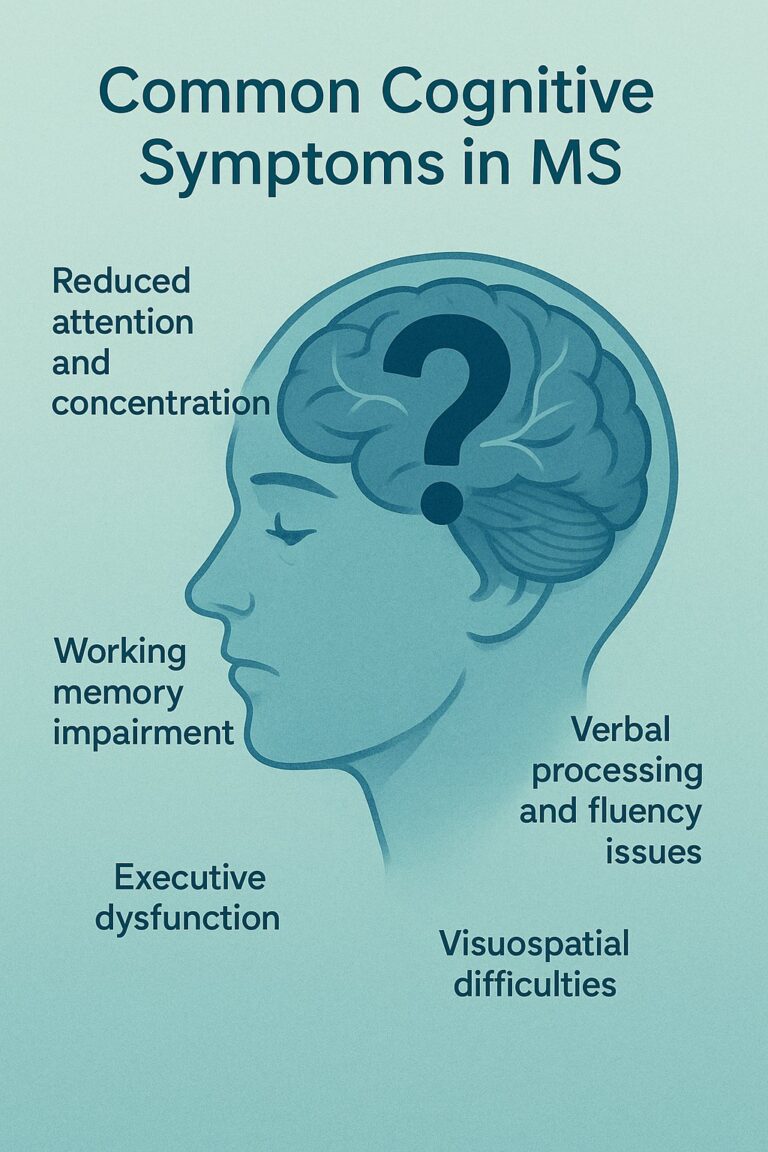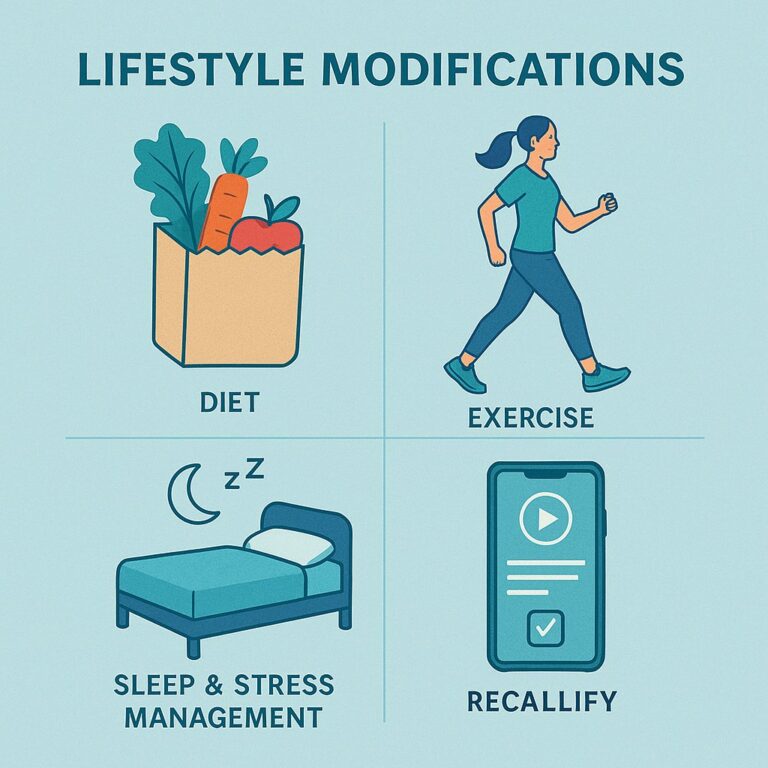Understanding and Managing Cognitive Challenges in MS: Cognitive Difficulties and Treatment Approaches
Adapted from a talk delivered by Dr Sarah Rudebeck, Senior Clinical Neuropsychologist and Co-founder of Recallify, at the invitation of MS-UK, July 2025. You can view the original slides here (PDF).

Cognitive changes in MS are real and clinically significant
Approximately 65% of individuals living with multiple sclerosis (MS) experience cognitive difficulties at some point during the course of their condition. These symptoms may affect memory, attention, processing speed, and executive functioning. Although often less visible than physical impairments, they can significantly impact day to day functioning, work, relationships, and quality of life.
These cognitive difficulties arise when MS-related inflammation and demyelination disrupt neural pathways in the brain and spinal cord that support higher order cognitive processes.
Common MS Cognitive Difficulties
Cognitive impairment in MS can present with a range of features, including:
- Reduced attention and concentration: Difficulty maintaining focus, particularly in distracting environments.
- Working memory impairment: Challenges holding and manipulating information over short periods (e.g. remembering verbal instructions or tasks). Working memory is the gateway to long term memory, so difficulties here can have a cascading effect on what is retained over time.
- Verbal processing and fluency issues: Word-finding difficulties, slowed verbal output, or increased frequency of “tip of the tongue” experiences.
- Executive dysfunction: Problems with planning, organising, initiating, or sequencing tasks.
- Visuospatial difficulties: Impaired ability to interpret spatial relationships, visual patterns, or environmental cues.
Cognitive fatigue often co-occurs and may exacerbate these symptoms. It is a major barrier to maintaining cognitive performance over time. Collectively, these are often described as MS cognitive difficulties and can affect different people in different ways.
Emotional and Psychological Impact
Cognitive changes in MS frequently occur alongside affective symptoms. Approximately 50–60% of people with MS experience depression, 30–40% report anxiety, and emotional lability (e.g. rapid mood shifts, irritability, apathy) is not uncommon. These issues may arise from both the neurobiological effects of MS and the psychological adjustment to living with a chronic condition.
Clinical Assessment of Cognitive Function
Assessment of cognitive changes is typically conducted by a neuropsychologist as part of a multidisciplinary care pathway. This includes:
- Clinical Interview: Gathering information on day-to-day cognitive difficulties, with input from family members where appropriate.
- Standardised Cognitive Testing: Objective assessment of memory, attention, language, and executive functioning using validated neuropsychological tools.
- Comprehensive Reporting: A written report highlighting cognitive strengths and weaknesses, with clear recommendations for workplace, educational, or rehabilitation support.
Assessments can support medical decision-making, guide cognitive rehabilitation planning, and provide evidence for workplace or educational accommodations. Cognitive assessment can also help distinguish MS related cognitive changes from other conditions such as mild cognitive impairment (MCI), depression related cognitive difficulties, or the effects of medication. This differential diagnosis is important because the treatment approach may differ depending on the underlying cause.
Treatment for MS Cognitive Difficulties
There is no singular treatment for cognitive impairment in MS; however, a number of approaches are considered clinically beneficial and evidence-based. These represent the main avenues currently available for MS cognitive symptoms treatment:
1. Cognitive Rehabilitation Strategies
These approaches aim to mitigate cognitive impairment through a combination of compensatory techniques and skill-building. Examples include:
- External Memory Aids: Use of structured tools such as diaries, calendars, alarms, and digital reminders to support memory and planning.
- Routine Formation: Establishing consistent daily routines to reduce the cognitive demand associated with decision-making and sequencing.
- Environmental Modification: Reducing external distractions and organising physical environments to support sustained attention and task efficiency.
- Task Simplification: Breaking down complex tasks into smaller, more manageable components.
- Strategy Training: Use of techniques such as categorisation, rehearsal, visual imagery, and active recall and spaced repetition to support memory encoding and retrieval.
These interventions are typically delivered by neuropsychologists, occupational therapists, or through structured self-management programmes.
2. Psychological Therapies
- Acceptance and Commitment Therapy (ACT): ACT supports individuals in developing psychological flexibility, enabling them to live in alignment with personal values despite the presence of symptoms. It is particularly helpful for managing distress, fatigue, and adjustment to diagnosis.
- Compassion-Focused Therapy (CFT): CFT promotes emotional regulation and self-kindness, especially in individuals with elevated shame or self-criticism. It can be beneficial for individuals navigating identity changes related to cognitive decline.
3. Cognitive Remediation Therapy (CRT)
CRT is a structured, often computer-assisted intervention designed to enhance cognitive function through repeated practice and adaptive training. Key features include:
- Targeted training of attention, memory, and executive function
- Use of adaptive difficulty to ensure tasks remain appropriately challenging
- Generalisation of skills to everyday activities
A Cochrane review (Campbell et al., 2016) found moderate evidence supporting CRT in improving cognitive performance in MS, particularly in attention and memory.
Lifestyle Modifications
There is growing evidence that lifestyle interventions can positively influence cognitive and neurological outcomes in MS:
- Dietary Adjustments: Reducing intake of ultra-processed foods, sugar, and alcohol, and increasing intake of whole foods and vegetables may support overall brain health.
- Physical Activity: Engaging in regular, manageable physical exercise can improve fatigue, mood, and cognitive performance.
- Sleep and Stress Management: Prioritising rest and adopting stress-reduction strategies (e.g. mindfulness, pacing) are essential for optimising cognitive functioning.
- Avoiding Risk Factors: Smoking cessation and maintaining hydration are recommended as part of broader disease management.
Simple daily routines like these can reduce the impact of MS cognitive difficulties and improve overall well-being.

Technology-Assisted Strategies
Digital tools can provide highly supportive, evidence-informed strategies to manage cognitive difficulties:
- Smart Calendars and Reminders: Tools like Google Calendar, Cozi, or Apple Reminders can help schedule tasks and prompt actions.
- Location-Based Prompts: Geofencing-based reminders can trigger notifications based on your location (e.g. “Remind me to buy milk when I get to Tesco”).
- Assistive Devices: Including smart pillboxes, wearable devices with alarms, and voice-controlled assistants to support day-to-day functioning.
- Brain Training Apps: Apps such as BrainHQ, Lumosity, and CogniFit offer cognitive exercises; while evidence for generalisation remains limited, they may support mental stimulation.
For many, digital strategies are now an important complement to more traditional MS cognitive symptoms treatment methods.
How Recallify can help
Recallify is an AI-powered memory and learning support app developed for individuals with cognitive challenges due to neurological conditions—including MS.
Key features include:
- Live Recording and Transcription: Capture meetings, conversations, or events and generate instant plain-English summaries.
- Personalised Recall Tools: AI-generated quizzes and memory checks to reinforce important content.
- Integrated Reminders: Convert recorded information into time- or location-based reminders within your own calendar.
- Encrypted Personal Vault: All data is stored privately and securely—content is doubly encrypted and not accessible to anyone but the user.
“With Recallify, I could record a four-hour session and later read a summary. It filled in the gaps my brain missed.”
Julie, Recallify user with neurological fatigue
Recallify is designed to support cognitive independence and reduce reliance on others for information retention and retrieval.
Get Involved
We are actively seeking feedback from individuals with MS to further refine and tailor Recallify for this community. If you are living with MS and would like to share your experience, we would welcome your input.
Please get in touch @ sarah [at] recallify [dot] ai .
Frequently Asked Questions
What are the cognitive problems with MS?
MS can affect several areas of cognitive function, including memory, attention and concentration, processing speed, word finding, executive function (planning and organising), and visuospatial skills. Around 65% of people with MS experience some degree of cognitive difficulty. These vary from person to person and may fluctuate with fatigue, stress, and relapses.
Does MS affect cognitive function?
Yes. MS related inflammation and demyelination can disrupt the neural pathways that support cognitive processes. The areas most commonly affected are processing speed, working memory, and sustained attention. Cognitive changes can occur at any stage of MS, including early in the condition, and do not always correlate with physical disability.
What is the treatment for cognitive impairment in MS?
Treatment typically involves a combination of approaches: cognitive rehabilitation strategies (such as using memory aids, routine building, and task simplification), psychological therapies (particularly Acceptance and Commitment Therapy and Compassion Focused Therapy), cognitive remediation therapy, and lifestyle modifications including exercise, sleep, and diet. There is no single medication that treats MS cognitive impairment directly, but disease modifying therapies that reduce relapses may help protect cognitive function over time.
Can MS cause cognitive impairment?
Yes. Cognitive impairment is a recognised and clinically significant feature of MS. It results from the same inflammatory and demyelinating processes that cause physical symptoms. Cognitive difficulties can occur independently of physical disability and may be present even when other MS symptoms are well managed. Early cognitive assessment and intervention can make a meaningful difference.
Does MS cause memory loss?
MS can affect memory, particularly working memory (the ability to hold and use information over short periods) and the ability to learn and retain new information. It tends to affect the efficiency of memory encoding and retrieval rather than causing the kind of progressive memory loss seen in conditions like Alzheimer’s disease. Strategies such as active recall and spaced repetition, external memory aids, and structured routines can help manage these difficulties in daily life.
Where can I get support for MS cognitive difficulties?
Your MS specialist nurse or neurologist can refer you for a neuropsychological assessment. Charities such as the MS Society and MS Trust provide information and support. Recallify is designed to provide practical daily support for memory, task management, and learning for people with cognitive challenges, including MS.


